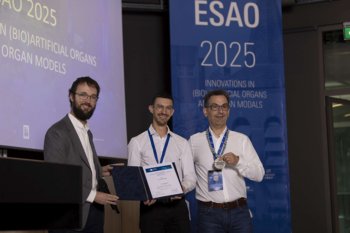Innovations in (Bio)Artificial Organs and Organ Models
From June 25 to 28, 2025, the European Society for Artificial Organs (ESAO) hosted its annual international congress, ESAO 2025, at the TechMed Centre of the University of Twente in Enschede. Under the central theme “Innovations in (Bio)Artificial Organs and Organ Models,” global experts from science, medicine, and engineering gathered to exchange knowledge and explore the future of organ support, replacement, and regeneration.
The scientific programme reflected the rapidly expanding frontiers of artificial organ technology. Topics ranged from innovations in bioartificial heart, lung, kidney, liver, and pancreas to complex multi-organ systems and hybrid platforms that mimic human physiology more accurately than ever. Cutting-edge sessions on organs-on-chips, in vitro and in vivo models, and in silico simulations illustrated how new tools are accelerating drug development and therapeutic testing. Presentations also addressed breakthroughs in tissue regeneration, bioengineering strategies, and biomaterials designed to improve device functionality and biocompatibility.

Bridging innovation and clinical practice: insights from leading experts
This focus on innovation was matched by an emphasis on clinical translation. Sessions explored novel devices like artificial heart pumps, oxygenation systems for artificial lungs, and emerging platforms for pancreatic support. The role of biomechanics, hemodynamics, and sensor-driven feedback systems was examined in detail, alongside the growing relevance of digital twins and patient-specific imaging. ESAO 2025 provided a unique view on how organ-specific innovations and system-level thinking converge in real-world clinical applications.
The congress opened on Wednesday, June 25, with a warm welcome from conference chair Prof. Dimitrios Stamatialis and ESAO president Prof. Ulrich Steinseifer, followed by an inspiring keynote from Dr. Stephen R. Ash on innovation in medical device development. The following days featured rich keynote contributions from Prof. Shuvo Roy (on silicon membranes for implantable bioartificial kidneys), Prof. Andries van der Meer (on organ-on-chip applications), and Dr. Cristiano Amarelli (on heart support technologies), inspiring across disciplines.

A rich scientific programme and a vibrant exchange of ideas
Sessions, symposia, and poster presentations formed the backbone of ESAO 2025, offering a broad and in-depth view of the latest developments across the field. The scientific programme included over 100 abstract submissions, which were presented in oral and poster sessions covering topics such as blood purification, hemodynamic simulations, albumin therapy, omics-based diagnostics, and the active role of patients in driving innovation.
Running parallel to the main programme, seven invited symposia provided a platform for international experts to delve into pressing themes in organ support and regeneration, ranging from pediatric circulatory support and personalised medicine to system-level innovation roadmaps and the role of patient foundations in shaping research agendas. These high-level sessions enriched the programme with keynote lectures, in-depth case studies, and global perspectives.

At the heart of the venue, the Innovation Square served as both a scientific and social hub. Here, ESAO 2025 sponsors, including acbiomed, Magassist, and NXTGEN showcased cutting-edge technologies and connected with participants in an informal setting. The space encouraged spontaneous dialogue, hands-on demonstrations, and new collaborations, underscoring the dynamic ecosystem surrounding artificial organ innovation.
A festive conference dinner at the Twentsche Foodhal on Friday evening brought participants together to celebrate new insights and connections, as well as the award winners of the ESAO PhD Prize, SAGE Award, and yESAO Awards.
Celebrating outstanding contributions
During the closing ceremony on the final day, two important awards were announced:
- Corentin Raveleau (Université de Montpellier, France) received the Best Oral Presentation award for his talk “Impact Of Microstructured Artificial Surface On The Dynamics Of Blood Platelets.”
- Nienke Reitsma (AMOLF, Autonomous Matter Department) was awarded Best Poster Presentation for “Evaluation of Materials for a Soft Artificial Ventricle.”


Uniting minds, shaping tomorrow’s organ solutions
With participants from a wide range of backgrounds, including clinicians, biomedical engineers, scientists, computational modellers, and others, ESAO 2025 embodied the spirit of interdisciplinarity and a future-focused approach. The University of Twente’s TechMed Centre, with its inspiring rooms and collaborative research culture, proved to be the ideal host for this international gathering.
In four intensive days, ESAO 2025 showcased how biology, technology, and clinical care can come together to tackle one of the most urgent healthcare challenges of our time. The event was not just a scientific meeting, but a powerful reminder of the transformative potential of innovation in artificial organ research.









